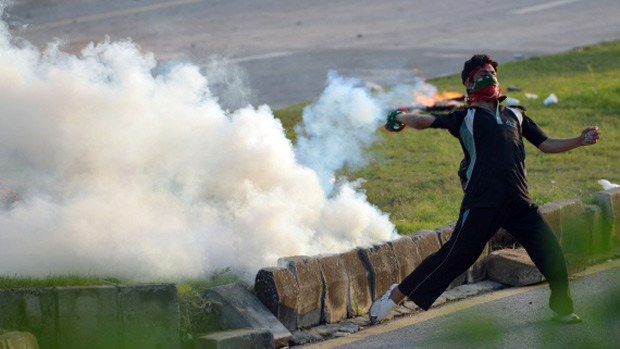Pakistan: what's behind the deepening political crisis?
Protesters clash with police and attempt to storm PM's house as 'all hell breaks loose' in Islamabad

A free daily email with the biggest news stories of the day – and the best features from TheWeek.com
You are now subscribed
Your newsletter sign-up was successful
After weeks of protests in the Pakistani capital of Islamabad, tensions in Parliament Square reached a "predictable escalation" over the weekend, according to Al Jazeera.
Three people were killed and hundreds injured after the police cracked down on protesters who were attempting to march on the official residence of Prime Minister Nawaz Sharif. According to Pakistan's police chief, protesters were armed with "axes and hammers" and tore down the outer wall of parliament.
Police have been criticised for their disproportionate response after teargas and rubber bullets fired at protesters by 40,000 riot officers. Wajahat Saeed Khan, a Pakistani journalist said "the police are known for their brutality, particularly in the Punjab province".
The Week
Escape your echo chamber. Get the facts behind the news, plus analysis from multiple perspectives.

Sign up for The Week's Free Newsletters
From our morning news briefing to a weekly Good News Newsletter, get the best of The Week delivered directly to your inbox.
From our morning news briefing to a weekly Good News Newsletter, get the best of The Week delivered directly to your inbox.
Who is behind the protests?
The two small opposition groups credited with orchestrating the protests are united in their calls for the resignation of the country's Prime Minister. However, both sides have denied instructing their supporters to use violence or occupy official buildings. "The people who came out to protest were looking for a better country," said Mosharraf Zaidi the former Pakistani foreign affairs adviser, but when they clashed with police, "all hell broke loose".
Pakistan Tehreek-e-Insaf (Pakistan Justice Movement)
Led by the famous cricketer-turned-politician Imran Khan, the party accuses Sharif of rigging last year's historic election, in what was the first democratic transition of power in the country's history.
A free daily email with the biggest news stories of the day – and the best features from TheWeek.com
Pakistan Awami Tehreek (PAT)
Tahir ul-Qadri is the influential Canadian-Pakistani cleric and head of the party calling for a "revolution" and demanding the complete overhaul of the country's political and economic system. He is demanding the dissolution of Pakistan's government and calling for the establishment of an interim unity government.
The role of the military
Rumours of military involvement have been widely circulated in Pakistan with some calling it a 'soft coup'. Many Pakistani's believe that Sharif has angered military by "seeking closer relations with India," which would could lead to a decrease in military funding, writes Channel 4's John Sparks. The army has denied the allegations and says it is serving as a mediator between the protesters and government.
What next?
Sharif has held high-level crisis talks with the army chief General Raheel Sharif today, according to the BBC, but both parties have yet to issue a statement. "Pakistan's parliamentary democracy is at stake. A decision has to be made fast," warned Zaidi.
The government has said it willing to conduct an investigation into the allegations of vote-rigging but ruling party members say the Prime Minister will not step down. All elected parties have pledged their support to Sharif, writes Raza Rumi for Al Jazeera. One minister told the Express Tribune:"we might have to give big sacrifices".
Sharif has been "considerably weakened" and "even if he survives the crisis, it may not be the end of the story. If the PM is forced to resign it sets a wrong and dangerous precedent," writes Rumi.
-
 Bad Bunny’s Super Bowl: A win for unity
Bad Bunny’s Super Bowl: A win for unityFeature The global superstar's halftime show was a celebration for everyone to enjoy
-
 Book reviews: ‘Bonfire of the Murdochs’ and ‘The Typewriter and the Guillotine’
Book reviews: ‘Bonfire of the Murdochs’ and ‘The Typewriter and the Guillotine’Feature New insights into the Murdoch family’s turmoil and a renowned journalist’s time in pre-World War II Paris
-
 Witkoff and Kushner tackle Ukraine, Iran in Geneva
Witkoff and Kushner tackle Ukraine, Iran in GenevaSpeed Read Steve Witkoff and Jared Kushner held negotiations aimed at securing a nuclear deal with Iran and an end to Russia’s war in Ukraine
-
 How corrupt is the UK?
How corrupt is the UK?The Explainer Decline in standards ‘risks becoming a defining feature of our political culture’ as Britain falls to lowest ever score on global index
-
 The high street: Britain’s next political battleground?
The high street: Britain’s next political battleground?In the Spotlight Mass closure of shops and influx of organised crime are fuelling voter anger, and offer an opening for Reform UK
-
 Is a Reform-Tory pact becoming more likely?
Is a Reform-Tory pact becoming more likely?Today’s Big Question Nigel Farage’s party is ahead in the polls but still falls well short of a Commons majority, while Conservatives are still losing MPs to Reform
-
 Taking the low road: why the SNP is still standing strong
Taking the low road: why the SNP is still standing strongTalking Point Party is on track for a fifth consecutive victory in May’s Holyrood election, despite controversies and plummeting support
-
 'What's profitable today is not unification. It's segmentation.'
'What's profitable today is not unification. It's segmentation.'Instant Opinion Opinion, comment and editorials of the day
-
 What difference will the 'historic' UK-Germany treaty make?
What difference will the 'historic' UK-Germany treaty make?Today's Big Question Europe's two biggest economies sign first treaty since WWII, underscoring 'triangle alliance' with France amid growing Russian threat and US distance
-
 Is the G7 still relevant?
Is the G7 still relevant?Talking Point Donald Trump's early departure cast a shadow over this week's meeting of the world's major democracies
-
 Angela Rayner: Labour's next leader?
Angela Rayner: Labour's next leader?Today's Big Question A leaked memo has sparked speculation that the deputy PM is positioning herself as the left-of-centre alternative to Keir Starmer